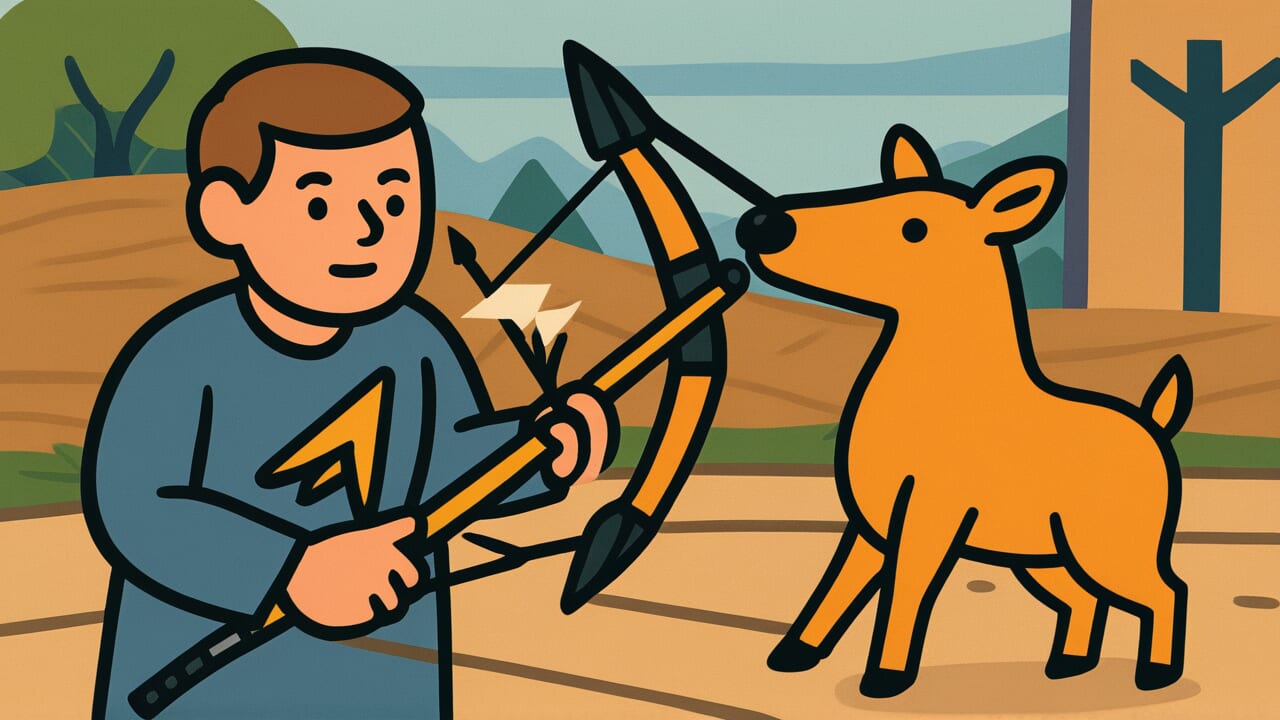How to Read “Seeing the deer and then feathering the arrow”
Shika mite ya wo hagu
Meaning of “Seeing the deer and then feathering the arrow”
“Seeing the deer and then feathering the arrow” means it’s too late to start preparing after you’ve found an opportunity. This proverb teaches that rushing to prepare only after a chance appears is already too late.
This saying is used to warn against lack of preparation. Think of students who open their textbooks for the first time the night before an exam. Or business people who start making materials right before an important meeting.
Chances come suddenly and disappear just as quickly. If you start preparing in that moment of panic, you’ve already missed your opportunity.
This lesson remains important in modern society. Job hunting, certification exams, presentations—in every situation, advance preparation determines success or failure.
Don’t wait until the opportunity arrives to start moving. Get your preparation perfect before the chance comes. This proverb teaches us the importance of that mindset.
Origin and Etymology
No clear written records remain about the origin of this proverb. However, we can make interesting observations from how the phrase is constructed.
Let’s focus on the expression “feathering the arrow.” This refers to attaching the arrowhead to the shaft or arranging the feathers. In other words, it’s the preparation work that makes an arrow ready to use.
In hunting and warfare, arrows were tools that should be kept in perfect condition beforehand.
The scene this proverb depicts is the exact moment of a hunting failure. A deer suddenly appears in the forest—a perfect opportunity. But the hunter panics and starts preparing his arrow right then and there.
He attaches the arrowhead, arranges the feathers, and sets it to the bowstring. While he’s doing all this work, the deer becomes alert and runs away.
Since ancient times, hunting was an important part of life in Japan. Encounters with prey lasted only an instant. Missing that opportunity could mean your family would go hungry.
That’s why this proverb carries the lesson that preparation should always be complete. Opportunities won’t wait for you. Preparation must be finished before the opportunity arrives.
This is practical wisdom born from the hunting life.
Usage Examples
- Starting self-analysis after your interview date is set is like seeing the deer and then feathering the arrow
- Running to buy disaster supplies after a typhoon is announced is exactly seeing the deer and then feathering the arrow
Universal Wisdom
“Seeing the deer and then feathering the arrow” speaks about a fundamental human weakness. We tend not to seriously prepare until a chance appears right in front of us. Why is this?
It’s because future opportunities don’t feel real to us. We know in our heads that “someday there will be a test” or “someday there will be an interview.” But these only feel real when that day draws near.
The human brain is designed to prioritize immediate comfort over distant future events. That’s why preparation gets pushed back.
However, our ancestors saw through this human nature. Through the life-or-death activity of hunting, they understood the importance of preparation in their bones.
Encounters with prey last only an instant. For that single instant, there must be steady daily preparation. Sharpening arrows, maintaining bowstrings, polishing hunting skills.
This daily accumulation is what creates success in the decisive moment.
This proverb has been passed down for so long because humans continue to have this weakness. Even as times change, we still get swept up in immediate concerns and neglect preparation.
That’s why this ancient wisdom still rings out as a fresh warning today.
When AI Hears This
The human brain has a characteristic of calculating preparation time as a “loss” when it sees an opportunity right in front of it. For example, the moment you spot a deer, your brain unconsciously compares “70% chance the deer escapes during 30 seconds of arrow preparation” versus “20% chance of hitting if you shoot now.”
What’s interesting is that even though preparing before shooting has a higher expected value when calculated calmly, humans assign negative points to the passage of time itself.
Prospect theory from behavioral economics explains this. Humans react twice as sensitively to losses as to gains. So preparation time, which is “time you’ll definitely lose,” feels heavier than improved success rate, which is an “uncertain benefit.”
In the hunting era, if you let prey escape, you didn’t know when the next one would appear. In that environment, this instinct for immediate decision-making was advantageous for survival.
But in modern society, the situation has reversed. In many situations like studying for certification exams or making investment decisions, preparation time greatly increases success rate. Yet the brain still operates on the old program of “you’ll lose if you don’t act now.”
This proverb has been passed down for thousands of years because it’s a warning against the time-discounting bias carved into the human brain. The habit of logically recalculating the value of preparation is the key to overwriting this instinct.
Lessons for Today
What this proverb teaches modern people is that the accumulation of small daily preparations becomes the power to seize life’s big chances.
Look around you. Successful people aren’t succeeding through luck alone. They’re continuing steady preparation where others can’t see.
Every day they polish their skills a little, accumulate knowledge, and build relationships. Because they have this daily accumulation, when chances come, they can seize them with certainty.
There are things you can start today. Learn a little today about a skill you might need tomorrow. Value today a relationship with someone who might help you someday.
Each of these small preparations will change your future.
Chances won’t wait for you. But if you’re prepared, you don’t need to wait for chances. No matter when opportunity arrives, you’re already fully prepared.
How reassuring it is to be in that state! I hope today becomes the first step in your preparation.



Comments